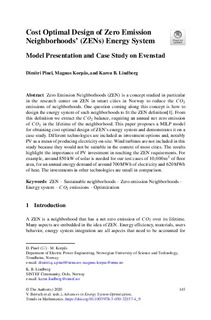Cost Optimal Design of ZEN’s Energy System: Model Presentation and Case Study on Evenstad
Chapter, Conference object, Peer reviewed
Published version
Permanent lenke
http://hdl.handle.net/11250/2638563Utgivelsesdato
2019Metadata
Vis full innførselSamlinger
- Publikasjoner fra CRIStin - SINTEF AS [5801]
- SINTEF Community [2247]
Sammendrag
Zero Emission Neighborhoods (ZEN) is a concept studied in particular in the research center on ZEN in smart cities in Norway to reduce the CO2 emissions of neighborhoods. One question coming along this concept is how to design the energy system of such neighborhoods to fit the ZEN definition[1]. From this definition we extract the CO2 balance, requiring an annual net zero emission of CO2 in the lifetime of the neighborhood. This paper proposes a MILP model for obtaining cost optimal design of ZEN’s energy system and demonstrates it on a case study. Different technologies are included as investment options and, notably PV as a mean of producing electricity on-site. Wind turbines are not included in this study because they would not be suitable in the context of most cities. The results highlight the importance of PV investment in reaching the ZEN requirements. For example, around 850 kW of solar is needed for our test cases of 10, 000 m2 of floor area, for an annual energy demand of around 700 MWh of electricity and 620 MWh of heat. The investments in other technologies are small in comparison.
